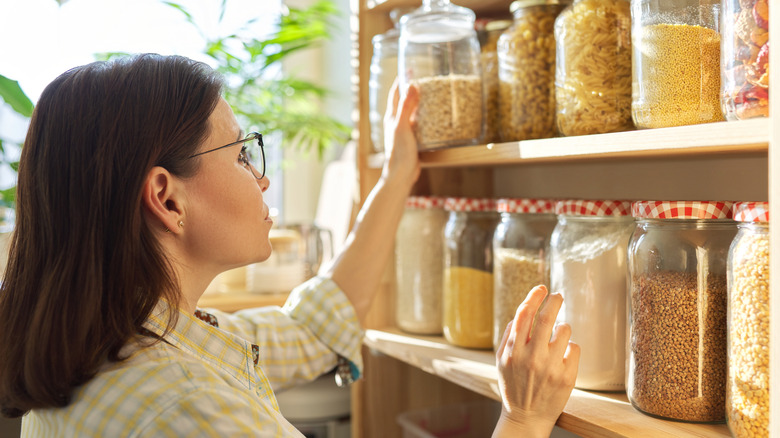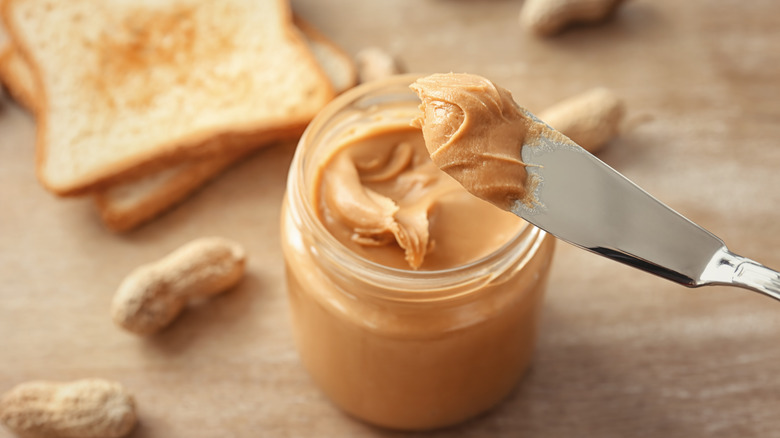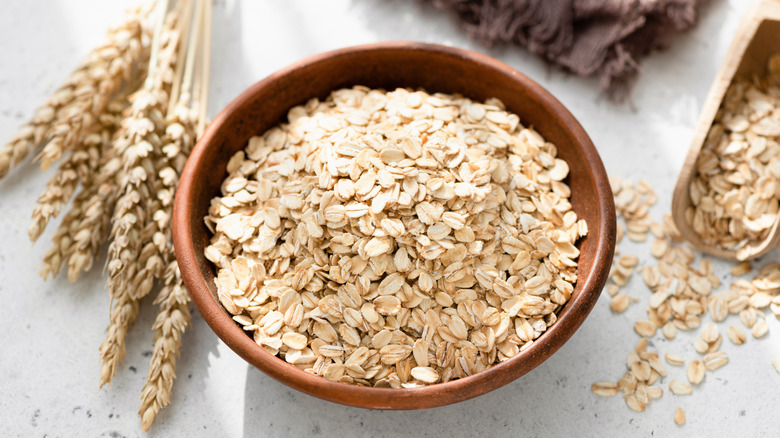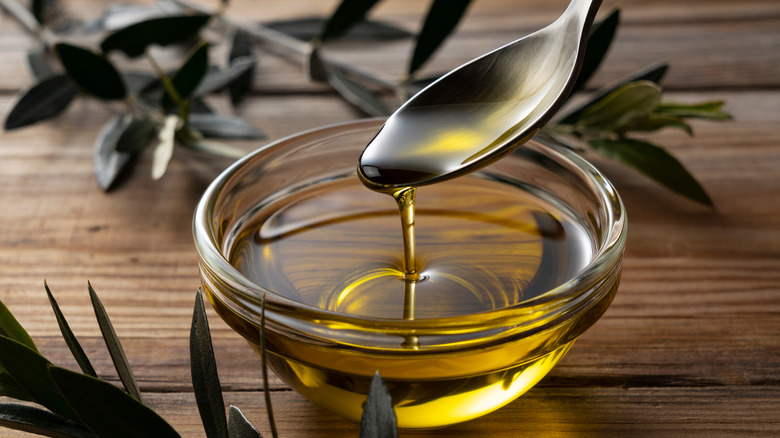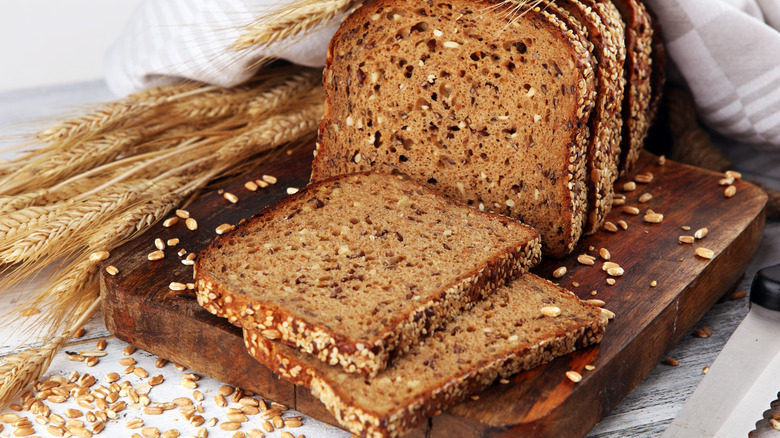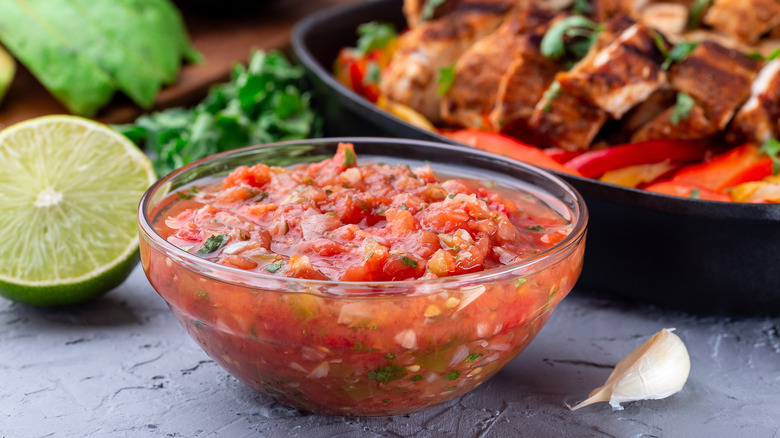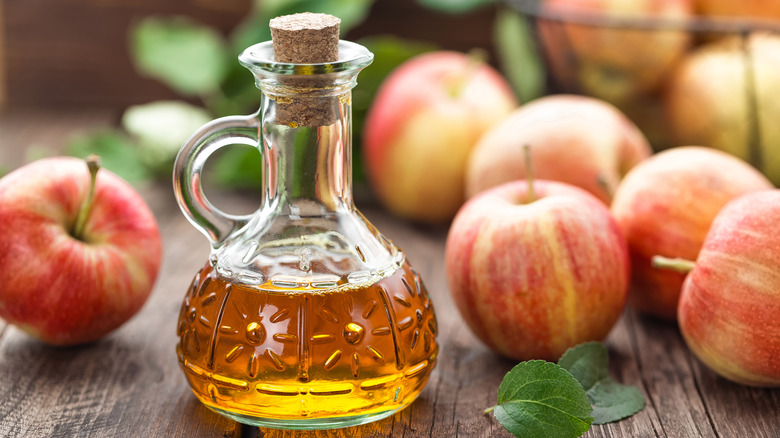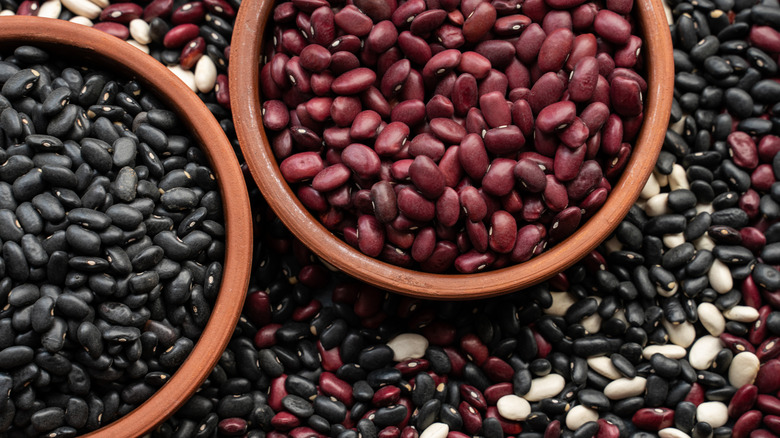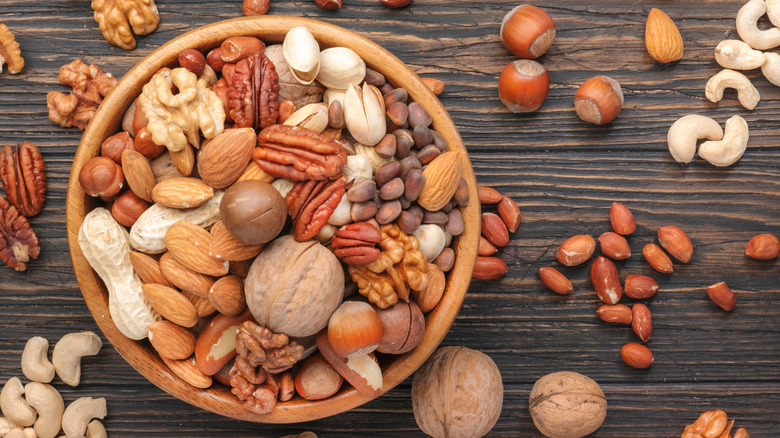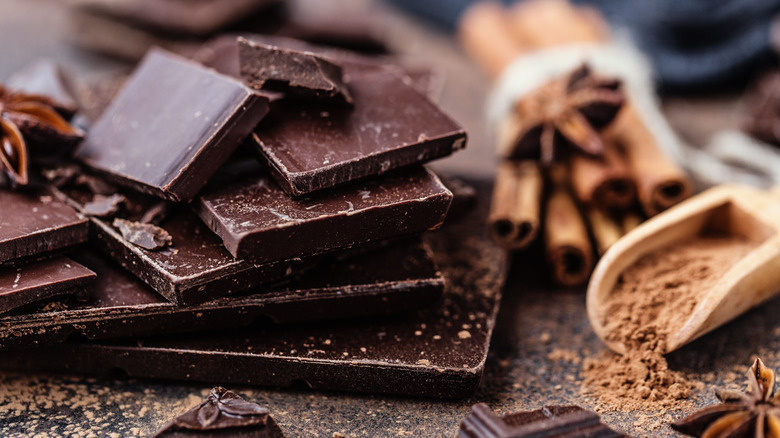Pantry Staples You Should Always Have If You Want To Eat Healthy
Whether you have been a long-time health nut or "being healthy" is a new resolution, there are numerous ways to maintain a happy and healthy lifestyle. When it comes to taking care of your mental, physical, and emotional well-being, it's important to set realistic, bite-sized goals for yourself (via Wellness Workdays). These goals could include walking a little more every day, cooking one more meal at home each week, or limiting your social media use. Not only will smaller goals keep you from feeling overwhelmed, but keeping your ambitions achievable is also the best way to ensure that you stick to these goals long-term.
When it comes to health goals, "eating healthy" is certainly one of the most popular ones. Thankfully, there are many approachable ways to sub healthy food into your diet. For one, you can start by stocking your pantry with healthy food items. Whether you need to throw together a quick dinner, or are looking to do some smart snacking throughout the day, a healthy pantry comes in handy on more than one occasion. Here are some essentials to stock up on today!
Peanut Butter
Whether you like it rich and creamy, or crunchy and chunky, there's no denying that peanut butter is a great addition to any dish (although it's also delicious by the spoonful). This versatile ingredient also happens to complement a wide range of flavor profiles, from savory Thai Noodles to sweet chocolate-flavored desserts.
An added bonus? Not only is peanut butter super tasty, but it's also a healthy bread spread. "Nut butters are a source of protein and fiber, and they're high in healthy fats," shared Ali Webster, the director of research and nutrition communications at the International Food Information Council, to HuffPost. According to Eat This, Not That, the protein in peanut butter helps individuals establish lean muscle, while simultaneously burning fat. Did you know that peanut butter also helps you sleep better at night?
Pro tip: steer clear of peanut butter brands that have "Reduced Fat" on the label. While there may be less fat in these peanut butters, the fat is usually replaced with sugars and unwanted additives. Ideally, you will want to pick out a brand that primarily includes nuts and a small amount of sea salt on the ingredient list.
Oats
Move aside, French toast and pancakes! When it comes to breakfast at home, you can't go wrong with a bowl of oatmeal. Warm, gooey, and comforting, oatmeal always gives you something to look forward to when your alarm clock goes off in the morning. All you need to do is top your morning meal with some nuts, berries, or spices and you are good to go. Not to mention, oats are reaping with health benefits. According to Healthline, this complex carbohydrate is bursting with vitamins, minerals, and antioxidants that can help prevent heart disease and low blood sugar levels.
This pantry staple is also full of fiber, which is one of the reasons why oatmeal helps you stay full for longer. An added bonus? Oats aren't as perishable as other commonly consumed carbs, such as bread. Because of its longer shelf life, oats are an ideal pantry staple to always have on hand (via Healthline). If you are looking to get other uses out of this whole grain, Sharon Palmer, MSFS, a registered dietitian nutritionist recommends using oats in baking bars, cookies, breads, and even homemade veggies burgers and patties (via Food Network).
Olive oil
Many people use olive oil for cooking, but if that's all you are using it for, you are missing out! "[Extra virgin olive oil] is one of the foundation foods of the Mediterranean diet that has long been heralded as one of the healthiest eating patterns to help add more years to your life and life to your years," shared Julie Upton, the co-founder of Appetite for Health and registered dietician with the Food Network. This versatile ingredient can be used as a foundation in homemade salad dressings and marinades, and used for sautéing vegetables on low heat, as noted by Taste of Home.
According to Eat This Not That, one of the reasons that olive oil is so good for you is because of its "levels of antioxidant compounds known as phenols." Olive oil has also been correlated with a growing amount of adiponectin in the body, "a hormone that breaks down belly fat." Want to make sure your olive oil is the real deal? When it comes to selecting a particular brand of olive oil at the grocery store, Eat This, Not That has a few expert tips. To ensure that you are getting relatively increased levels of phenols in your olive oil, make sure you purchase an "Extra Virgin" olive oil. Additionally, to avoid missing out on beneficial polyphenols and active compounds, opaque bottles and cold-pressed oils are preferable.
Whole grain bread
Sourdough, ciabatta, brioche, oh my! When you walk down the bread aisle at the grocery store, there is no shortage of loaves to choose between. That said, when it comes to health benefits, not all breads were created equal.
If you are trying to stock your pantry with the healthiest bread, whole grain takes the cake. According to Taste of Home, not only is whole grain bread relatively filling compared to white bread, but it is also more nutrient-dense. When it comes to picking out exact brands, a good general rule of thumb is to pick loaves with at least 5 grams of fiber per slice. Take note: while bread may live in the pantry, it doesn't have as long of a shelf-life as other pantry staples. According to Still Tasty, as a general rule of thumb, whole grain bread will usually stay good for about five to seven days on shelves.
Salsa
For those who like to keep things spicy and healthy in the kitchen, we've got the perfect pantry staple for you: salsa. Whether you prefer something light and chunky like Pico de Gallo or something rich and smooth like Salsa Roja, there's a salsa out there for everyone. While salsa recipes differ from brand to brand, this traditionally Mexican dip is typically a blend of fresh and canned vegetables including lime, jalapeño, garlic, onion, canned tomatoes, and green chiles (via Food Network).
While this zesty low carb sauce is most commonly paired with a giant bag of tortilla chips, salsa is not just a dip for chips. Bursting with flavor, this versatile condiment can be added to salads, baked potatoes, or kale chips, as noted by Taste of Home. If you didn't have time to stuff your fridge with fresh vegetables this week, salsa can make a great veggie substitute. Eat This, Not That recommends adding a 1/4 cup of this savory sauce to an omelet, blending it with ground beef to make meatloaf, or whipping up a salsa verde sauce to finish off a plain white fish dish.
Looking for a specific brand? With low sodium levels and a lack of unfamiliar ingredients, you can't go wrong with a brand like Newman's Own.
Apple Cider Vinegar
If you have traumatic memories of gargling Apple Cider Vinegar (ACV) as a small child, fear not. This tart liquid is more than just a home remedy for a sore throat — there are many life-changing uses of apple cider vinegar. For home chefs who like to experiment in the kitchen, ACV adds a unique, tangy element to homemade salads, marinades, and wellness shots (via Taste of Home). According to Eat This, Not That, ACV can also help aid with weight loss. Not only is ACV packed full of enzymes that can help assist with digestion, but it is also brimming with acetic acid, which helps keep individuals satiated for longer amounts of time by "[delaying] gastric emptying."
If you want to receive all the health benefits that ACV has to offer, make sure that you are selecting an unfiltered variation. When Apple Cider Vinegar is filtered, key components of this ingredient are removed such as iron, B vitamins, phenolic compounds, enzymes that aid with digestion, and probiotics.
Canned Beans
Beans, beans, they're good for your ... health! Whether you choose to add this pantry staple to a soup or salad, blend it into a dip, or pair it with meat and cheese, and whip up a tasty casserole, canned beans contribute fiber, protein, iron, and nutrients to every dish (via Taste of Home). "The versatility of canned beans is unmatched," said Ali Webster, the director of research and nutrition communications at the International Food Information Council, to HuffPost. Not only are canned beans quick and easy to heat up, but they also have a particularly long shelf life. According to Healthline, canned beans can be stored for 2-5 years at room temperature.
Packed full of protein, canned beans are a particularly wonderful pantry staple for plant-based eaters. "As a mom of three girls living a mostly plant-based lifestyle, cannellini beans are a pantry staple I cannot live without," said Malina Malkani, an MS, RDN, CDN, and media spokesperson for the Academy of Nutrition and Dietetics to the Food Network.
Nuts
Are you nuts about nuts? If so, we've got some good news for you. Not only are these salty snacks great to munch on, but they are good for you, too. According to Healthline, these tiny morsels are a packed with fiber, healthy fats, and plant protein. Studies have shown that the consumption of nuts can also help "support a healthy body weight" and reduce the risk of heart disease. Not only are these salty snacks nutrient-dense and keto and vegan friendly, but they also have a long shelf life. While shelf life differs from nut to not, on average, nuts can last about four months when stored at room temperature (via Healthline).
Whether you want to add this crunchy foods to a side salad, your morning oatmeal, or whip up your own trail mix, nuts can add a fun textural element to almost any dish. Perfect for smart-snacking, nuts are also delicious on their own. These pantry staples can be eaten on the go or kept on hand in an office drawer.
Dark Chocolate
This list wouldn't be complete without a little something sweet. If you have a sweet tooth, make sure to stock some dark chocolate on your pantry shelves. According to Eat This, Not That, when eaten on occasion, dark chocolate can aid with weight loss. It turns out that healthy candy isn't a complete oxymoron, after all!
While dark chocolate can be paired with oatmeal or eaten on its own, it's particularly beneficial when it's consumed with fruit. Dark chocolate compounded by fruit increases the speed of fermentation in the gut, which then reduces inflammation and weight.
To reap all of the health benefits that come with consuming dark chocolate, there are three golden rules you must follow at the grocery store. According to Eat This, Not That, you should choose a chocolate bar that is 70% or more cacao, contains under 10 grams of sugar per ounce and is "free of artificial flavors, milk fat, or extra oils."
